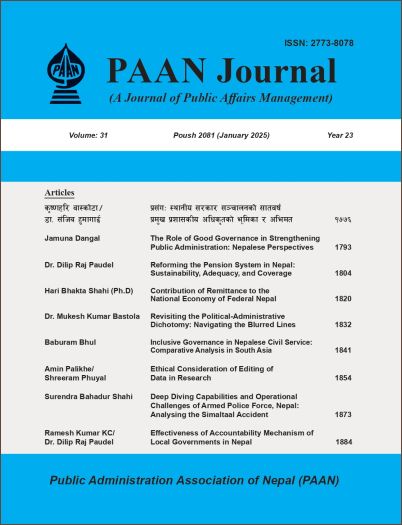Reforming the Pension System in Nepal- Sustainability, Adequacy, and Coverage
DOI:
https://doi.org/10.3126/paanj.v31i01.73606Keywords:
Social Security, Social Protection, Pension, Sustainability, Adequacy, CoverageAbstract
Pension systems ensure financial security during retirement, especially in developing countries like Nepal. The sustainability, adequacy, and coverage of pension systems are critical for ensuring social security after retirement, particularly in developing countries like Nepal. This study provides a comprehensive analysis of Nepal's pension framework, examining contributory and non-contributory schemes to identify their strengths, limitations, and areas for reform. Utilizing a mixed-method approach, primary data from 384 respondents and secondary sources, including reports from international organizations, were analyzed. Key findings reveal that contributory pension schemes are preferred for their sustainability and adequacy, while non-contributory schemes face fiscal constraints and limited coverage, especially for informal sector workers. Statistical analysis, including binary logistic regression, highlights living standards, service delivery efficiency, and scheme coverage as significant determinants of beneficiary satisfaction and preference. The study emphasizes the need for reforms to expand coverage, improve administrative efficiency, and ensure the financial viability of pensions. Drawing from global best practices, the research recommends introducing contributory elements into non-contributory schemes, aligning benefits with inflation, and adopting digital solutions for efficient service delivery. This research contributes to policy discussions on strengthening Nepal's pension system to achieve long-term social and economic stability.




